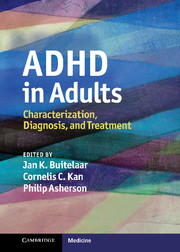Book contents
- ADHD in Adults
- ADHD in Adults
- Copyright page
- Contents
- Contributors
- Preface
- Section 1 The development of adult ADHD as an epidemiological concept
- Section 2 Insights into the pathophysiology of ADHD in adults
- Section 3 Assessment and diagnosis of adult ADHD
- Section 4 Comorbidities of adult ADHD
- 10 Adult ADHD and mood disorders
- 11 Attention-deficit hyperactivity disorder and anxiety disorders in adults
- 12 Attention-deficit hyperactivity disorder and the substance use disorders
- 13 Adult ADHD and organic brain disorders (including psychotic symptoms and tics)
- 14 Overlap between ADHD and autism spectrum disorder in adults
- 15 ADHD in adults with intellectual disabilities
- 16 ADHD, personality, and its disorders
- Section 5 Pharmacological treatment of adult ADHD
- Section 6 Psychological and social treatment strategies for adult ADHD
- Section 7 Alternative biological treatments
- Appendix 1: Patient organizations for ADHD (countries in alphabetical order)
- Appendix 2: Useful websites for ADHD (in alphabetical order)
- Index
13 - Adult ADHD and organic brain disorders (including psychotic symptoms and tics)
from Section 4 - Comorbidities of adult ADHD
Published online by Cambridge University Press: 04 April 2011
- ADHD in Adults
- ADHD in Adults
- Copyright page
- Contents
- Contributors
- Preface
- Section 1 The development of adult ADHD as an epidemiological concept
- Section 2 Insights into the pathophysiology of ADHD in adults
- Section 3 Assessment and diagnosis of adult ADHD
- Section 4 Comorbidities of adult ADHD
- 10 Adult ADHD and mood disorders
- 11 Attention-deficit hyperactivity disorder and anxiety disorders in adults
- 12 Attention-deficit hyperactivity disorder and the substance use disorders
- 13 Adult ADHD and organic brain disorders (including psychotic symptoms and tics)
- 14 Overlap between ADHD and autism spectrum disorder in adults
- 15 ADHD in adults with intellectual disabilities
- 16 ADHD, personality, and its disorders
- Section 5 Pharmacological treatment of adult ADHD
- Section 6 Psychological and social treatment strategies for adult ADHD
- Section 7 Alternative biological treatments
- Appendix 1: Patient organizations for ADHD (countries in alphabetical order)
- Appendix 2: Useful websites for ADHD (in alphabetical order)
- Index
Summary
- Type
- Chapter
- Information
- ADHD in AdultsCharacterization, Diagnosis, and Treatment, pp. 151 - 156Publisher: Cambridge University PressPrint publication year: 2011



